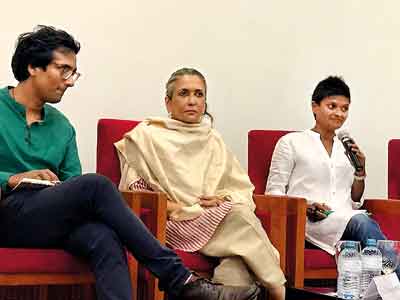We don’t become who we are in isolation: Deepa Mehta
In December 2012, India was shaken by the brutal rape of Jyoti Singh, a 23-year- old physiotherapy student. Gang-raped by six men on a bus in Delhi while her male friend was beaten up, the pair was then thrown out of the bus after the brutal assault. The crime shocked the nation.
It also left a lasting impression on film director Deepa Mehta. Choosing to explore the lives and dissect the mind of the six assailants she banded together with theatre artiste Neelam Chowdhry. In 2016 they released “Anatomy of Violence”, the focus of the film digging into the root cause of the attack and discussing themes such as poverty, misogyny, parenting and abuse through the lives of the six attackers.

Senel Wanniarachchi, Deepa Mehta and Jayanthi Kuru-Uthumpala at the panel discussion
The film was screened in Colombo on January 9 courtesy of the Canadian High Commission and Maldives Embassy in partnership with United Nations Population Fund (UNFPA) Sri Lanka, and the Bandaranaike Centre for International Studies. The packed audience was also privy to a panel discussion moderated by Jayanthi Kuru-Uthumpala with Deepa Mehta, Dr. Neelam Chowdhry, the Creative Director of Anatomy of Violence, Senel Wanniarachchi, Founder and Head of Hashtag Generation, and Ambika Satkunanathan, Commissioner of the Human Rights Commission of Sri Lanka.
The film is a departure from Mehta’s grander, more visually stunning works such as Midnight’s Children and the Elements Trilogy (Fire, Earth, Water). An almost docudrama, the stripped down movie was the result of workshops done by Mehta with the actors loosely based on the actual incident back in 2012. Over the course of the workshops she saw the characters unravel, their backstories providing audiences with some insight into the triggers behind violence against women. Although the film is rooted in the stories of the male characters, it does not particularly showcase them as victims, Mehta and Dr. Chowdhry explained. “We don’t become who we are in isolation,” Mehta explained. Balancing the portrayal of the men through a humane lens wasn’t easy, leaving room for them to be viewed sympathetically, as victims of abuse, the patriarchy, extreme poverty and the class system. The impact of these factors is laced throughout the movie; their own interactions with each other are friendly but violent. They are sometimes caring, carrying on normal day to day chores or engaging in violent acts. The director’s aim was to emphasize the factors which cultivate the vicious cycle, giving audiences a better awareness of the origins of such acts- which as the film shows begin most often at home. “It starts with family. To see them in humanity is to see them in reality,” Mehta added.
The impact of the film has reached beyond movie buffs and into schoolrooms and universities, creating a platform for awareness and discussion on counteracting violence against women. “Where sexual violence is concerned, we only take it seriously if it is horrific,” Ambika remarked, adding such situations make it easier to forget the other forms of violence and harassment.
For the panelists including the creators of the film, their work is successful only if it motivates both sexes. “It needs to be a world where both our sons and daughters want a better life,” stated Mehta.


